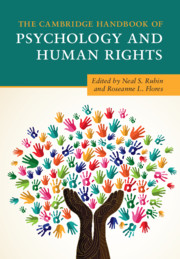Book contents
- The Cambridge Handbook of Psychology and Human Rights
- The Cambridge Handbook of Psychology and Human Rights
- Copyright page
- Dedication
- Contents
- Figures
- Tables
- Boxes
- Contributors
- Acknowledgments
- The Core International Human Rights Instruments and Their Monitoring Bodies
- Universal Human Rights Instruments
- Sustainable Development Goals
- Glossary of United Nations and Psychology Acronyms in the Handbook
- Introduction
- Part I History of Human Rights
- 1 How Fear and Hope Shaped the Universal Declaration of Human Rights
- 2 Human Rights Developments from the Universal Declaration to the Present
- 3 Connecting Human Rights and Psychological Ethics in a Globalizing World
- 4 A Historical Narrative of Psychology Engaging Human Rights within the Framework of the United Nations
- Part II The Intersection of Psychology and Human Rights
- Part III Contemporary Issues in Psychology and Human Rights
- Part IV Teaching, Research, and Training in Psychology and Human Rights
- Part V Future Directions
- Index
- References
3 - Connecting Human Rights and Psychological Ethics in a Globalizing World
Issues and Recommendations
from Part I - History of Human Rights
Published online by Cambridge University Press: 02 October 2020
- The Cambridge Handbook of Psychology and Human Rights
- The Cambridge Handbook of Psychology and Human Rights
- Copyright page
- Dedication
- Contents
- Figures
- Tables
- Boxes
- Contributors
- Acknowledgments
- The Core International Human Rights Instruments and Their Monitoring Bodies
- Universal Human Rights Instruments
- Sustainable Development Goals
- Glossary of United Nations and Psychology Acronyms in the Handbook
- Introduction
- Part I History of Human Rights
- 1 How Fear and Hope Shaped the Universal Declaration of Human Rights
- 2 Human Rights Developments from the Universal Declaration to the Present
- 3 Connecting Human Rights and Psychological Ethics in a Globalizing World
- 4 A Historical Narrative of Psychology Engaging Human Rights within the Framework of the United Nations
- Part II The Intersection of Psychology and Human Rights
- Part III Contemporary Issues in Psychology and Human Rights
- Part IV Teaching, Research, and Training in Psychology and Human Rights
- Part V Future Directions
- Index
- References
Summary
This chapter has two primary purposes. The first is to address the question of whether the psychology community has a responsibility to promote and protect human rights and, if so, what this means for psychology and for psychologists in the context of an increasingly globalizing world. The second is to examine how psychological ethics can support human rights in psychology and help further the promotion of human rights for the benefit of humanity. The chapter opens with a brief history of the origins and development of psychological ethics and human rights, and the implications of these histories for their contemporary meanings. Then, using the Universal Declaration of Ethical Principles for Psychologists and the Universal Declaration of Human Rights as the primary references, the ways in which psychological ethics and human rights complement and differ from each other are examined. The chapter ends with a series of recommendations for the integration of human rights into psychological ethics and for psychology’s involvement in the protection and promotion of human rights. The recommendations emphasize the importance of enlightened globalization, as well as the importance of psychology and the human rights movement working together to serve humanity.
Keywords
- Type
- Chapter
- Information
- The Cambridge Handbook of Psychology and Human Rights , pp. 41 - 55Publisher: Cambridge University PressPrint publication year: 2020
References
- 1
- Cited by

